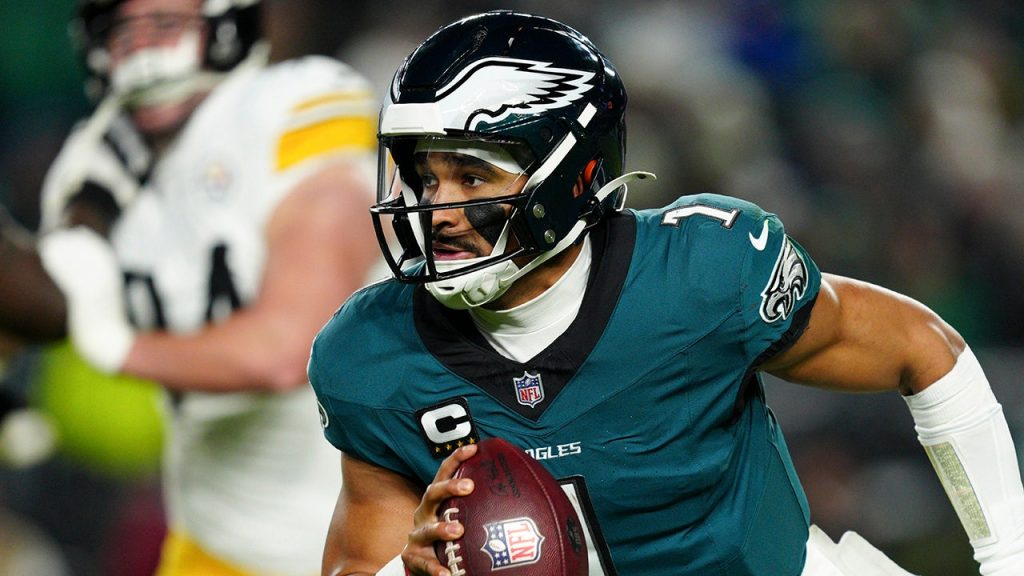Jalen Hurts, the dynamic quarterback of the Philadelphia Eagles, finds himself at the center of a brewing controversy, despite leading his team to a dominant position in the NFC East and a strong Super Bowl contention. While his on-field performance remains largely impressive, with the Eagles boasting a 10-game winning streak and Hurts posting career-high completion percentages, a recent post-game press conference has sparked debate about race, performance, and perception in the NFL. Following a victory against the Pittsburgh Steelers, where Hurts threw for 290 yards and two touchdowns, he appeared before the media sporting a prominent chain and opened his remarks with a seemingly playful challenge: “Is that what they wanted to see?” This comment, coupled with his attire, prompted ESPN analyst and former NFL cornerback Domonique Foxworth to accuse Hurts of benefiting from “pretty privilege.”
Foxworth argued that Hurts’ behavior, which he characterized as mimicking the swagger of quarterbacks like Josh Allen, was incongruous with his actual performance. He contended that Hurts’ single strong passing game didn’t warrant the flamboyant display, suggesting that the quarterback’s charisma and physical attractiveness shielded him from the criticism that a less conventionally appealing player might have faced. Foxworth’s remarks touched a nerve, raising questions about whether Hurts’ perceived “pretty privilege” allows him to escape scrutiny for inconsistencies in his performance, particularly in his passing game, which has seen some statistical decline compared to the previous season. This incident underscores the complexities of evaluating quarterbacks in the NFL, where statistics don’t always tell the full story, and image plays a significant role.
While the debate about “pretty privilege” swirls around him, Hurts continues to lead the Eagles to victory, showcasing both his talent and leadership. His statistics for the 2023 season, while not as eye-popping as his 2022 campaign, are still highly respectable. He has thrown for 2,892 yards and 18 touchdowns, with only five interceptions, maintaining a career-best completion percentage of 69.2%. The Eagles’ 12 wins under his leadership nearly match his 14-1 record as a starter in the previous season, demonstrating his continued ability to guide the team to success. These on-field accomplishments raise the question of whether Foxworth’s criticism is warranted or simply a misinterpretation of Hurts’ confidence and playful interaction with the media.
The controversy surrounding Hurts’ post-game comments highlights the intense scrutiny faced by quarterbacks in the NFL, where every action, both on and off the field, is dissected and analyzed. The debate about “pretty privilege” adds another layer of complexity to this scrutiny, raising questions about how race, attractiveness, and perceived charisma influence the public’s perception of players and their performance. Is Hurts genuinely benefiting from an unfair advantage, or is he simply expressing his confidence in a way that some find objectionable? This remains a central question in the ongoing discussion.
The focus on Hurts’ passing statistics, particularly the slight dip in yardage compared to the previous season, also raises questions about the evolving role of the quarterback in the modern NFL. While passing yards remain an important metric, the increasing emphasis on mobility and dual-threat quarterbacks complicates traditional evaluations. Hurts’ ability to contribute with his legs, while not reflected in his passing statistics, adds a significant dimension to the Eagles’ offense and contributes to their winning record. This raises the question of whether focusing solely on passing numbers provides a complete picture of a quarterback’s effectiveness.
As the Eagles continue their march towards the playoffs, the controversy surrounding Jalen Hurts serves as a microcosm of the larger debates surrounding player evaluation, race, and image in the NFL. While the “pretty privilege” debate rages on, Hurts’ on-field performance will ultimately determine his legacy. The coming weeks and the playoffs will offer a crucial test for Hurts and the Eagles, providing an opportunity to silence critics and solidify their place among the NFL’s elite. The outcome will undoubtedly shape the narrative surrounding Hurts, influencing whether he is remembered for his flamboyant post-game comments or his leadership on the field.

